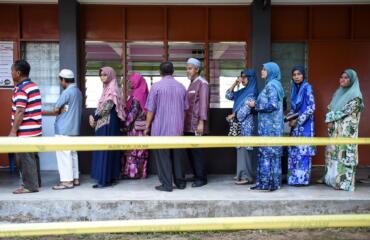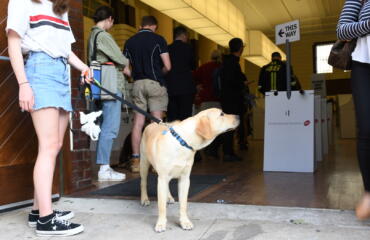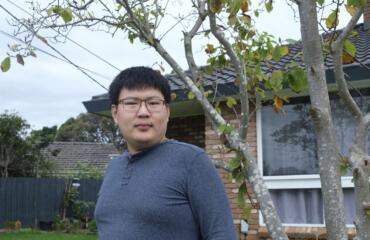A long way from home, 24 American citizens with no love for Donald Trump file into a small side room at Clocks, a pub in the shadow of Melbourne’s landmark meeting spot, Flinders Street Station.
Back in the United States, their fellow Democrats were voting in the primary elections. Despite thousands of miles of distance and sometimes years of absence, these voters were determined they were not going to miss out.
“Joe Biden is not my ideal candidate, but given the choices remaining, he’s the clear candidate,” said Michael Ramos, who has been living in Australia for the past eleven years.
While the 2024 US primary elections were underway in the US, in Melbourne a group called Democrats Abroad was helping American diaspora get their votes in for the Democratic Party’s nominee for the fast-looming presidential election in November.
Rolling up to cast their ballots, the voters said their main motivation was choosing a candidate with some chance of defeating former president Donald Trump, the presumptive Republican opponent in November. Ramos said of Trump: “I can tell you who I’m not going to vote for. Somebody who’s twice impeached, someone who’s been indicted four times.”
As for his decision to vote in the Democrats Abroad primary, Ramos described himself as “heavily politically involved” in American politics, from local to federal levels. “There’s no aspect of life that’s untouched by U.S. politics,” Ramos said.
“It doesn’t matter if I live there or not. If there’s a pothole on my grandma’s street, I’m going to be involved.”
Democrats Abroad, an official party organisation, arranged 95 in-person voting centres worldwide during March so Americans overseas could have their say on the Democratic nominee. Eligible Americans have also sent in ballots by email and post.
The American primary system can be bewildering – certainly to people outside the US, and also to many within it. Zim Nwokora, a senior lecturer in politics at Deakin University, described the primaries as a form of leadership selection. “Even if [the nominee doesn’t] win the presidential election, they basically hold the title of party leader up until the next round of presidential primaries.”
John Chabowski, an Australian resident for around 13 years, said the biggest issue in the 2024 primary election was ensuring “a certain individual [Trump] does not make it back into the White House”.
Although Chabowski said he has “assimilated [him]self into Australian culture”, he still volunteers at Democrats Abroad events.
“This is where I feel I have some say in what is going to happen. I don’t have much say in what happens here in Australia,” he said.
Volunteer organiser Carmelan Polce said that Democrats Abroad’s turnout this year had decreased from the numbers showed up in 2020, when with no incumbent president on the ballot, the question of who would be the nominee was still in the balance.
“It was still a very open question” who would win the nomination in 2020, Polce recalled.
“There was a lot of energy around choosing a candidate.”
But in the 2024 race, Democrats Abroad had “invested far less in the voting infrastructure than we did in 2020,” said Polce. “In 2020, we had three voting centers and two ballot assistance events. Whereas this year, we just had the one voting center and two ballot assistance events.
“It’s much more productive for us to spend our money on digital ads to find Americans to vote in the November election than in our global presidential primary, because it’s almost a foregone conclusion that President Biden will be our nominee.”
Apart from Biden, the only other candidate on 2024’s Democrats Abroad ballot was Marianne Williamson, a self-help writer who briefly ended her campaign in February before returning. The third option was “Uncommitted”, which voters could choose to show they were not satisfied with any candidate.
An “Uncommitted” campaign had surged in some parts of the US heading into the primaries as a mechanism to show voter unhappiness with President Biden’s handling of Israel’s invasion of Gaza.
“Uncommitted” won more than 101,000 votes in the Michigan primary election. Michigan has been a closely contested state in recent years, with Biden only winning Michigan by 155,000 votes in 2020’s general election. Toss-up states like Michigan could determine who is elected president in November.
According to Nwokora, lesser candidates like Williamson are not in the race to win, but rather to boost their fame and connections. “You can pin your campaign to a certain issue, and that could, in the long run, help you within the party — or whatever else you want to do.
“Incumbent presidents who want re-election don’t always win the election, but they do almost always win their party’s nomination,” Nwokora says.
Biden unofficially won the Democratic nomination for president on March 12, and will be officially named his party’s nominee in August. In November’s election, he will face Donald Trump for the presidency.
In Australia, Biden won the Democrats Abroad primary election with an overwhelming majority, taking 80% of the vote. Over 8,600 ballots were cast worldwide.
According to Polce, more ballots were cast in Australia than in any other Asia-Pacific nation. In Australia, 196 Americans voted.
There were 101,000 people recorded living in Australia who were born in the United States during the 2021 census, and 24,000 in Victoria. This does not include American citizens born in Australia, who would also be eligible to vote if they are over eighteen.
Polce said that after the primary election, Democrats Abroad “are using any means at our disposal to find U.S. citizens who may not know that they can vote.
“I’m not Australian, I don’t have the right to vote here,” said Ramos.
“But I do have representation in one place only, and that’s the U.S. So why not exercise that?”




